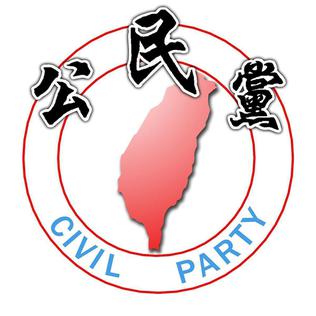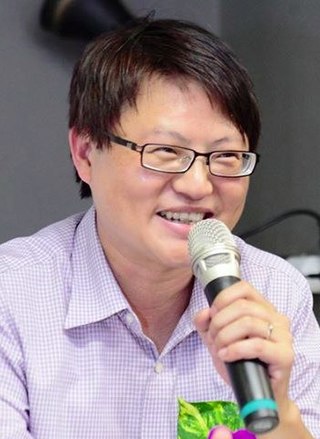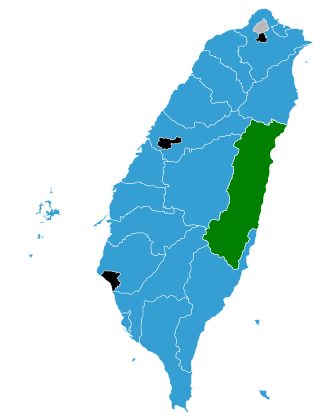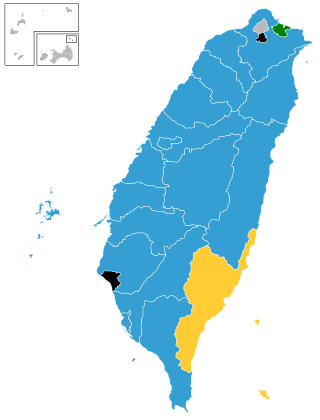
The Democratic Progressive Party (DPP) is a Taiwanese nationalist and centre to centre-left political party in Taiwan. It is currently the major ruling party in Taiwan, controlling both the presidency and the central government, also the dominant party in the Pan-Green Coalition.

Taiwan, officially known as the Republic of China (ROC), is governed in a framework of a representative democratic republic under a five-power system first envisioned by Sun Yat-sen in 1906, whereby under the constitutional amendments, the President is head of state and the Premier (President of the Executive Yuan) is head of government, and of a multi-party system. Executive power is exercised by the Executive Yuan. Legislative power is vested primarily in the Legislative Yuan. The judiciary is independent of the executive and the legislature. In addition, the Examination Yuan is in charge of validating the qualification of civil servants, and the Control Yuan inspects, reviews, and audits the policies and operations of the government. The party system is currently dominated by two major parties: the Kuomintang (KMT), which broadly favors maintaining the constitutional framework of the Republic of China Constitution and deepened economical cooperation with mainland China, and the Democratic Progressive Party (DPP), which broadly favors de jure Taiwanese Independence, and the eventual abolition of the ROC Constitution in favor of creating a "Taiwanese Republic."

The Taiwan Solidarity Union (TSU) is a political party in Taiwan which advocates Taiwan independence, and is affiliated with the Taiwanese localization movement. It was officially founded on 12 August 2001 and is considered part of the Pan-Green Coalition. Unlike the Democratic Progressive Party, its larger companion party in the Pan-Green Coalition, the TSU actively campaigns for the creation of a de jure Republic of Taiwan. The future of the party is in doubt after the 2016 elections as the party failed to secure enough votes to be eligible for state funding.

The National Assembly was the authoritative legislative body of the Republic of China, from 1947 to 2005. Along with the Control Yuan and the Legislative Yuan, the National Assembly formed the tricameral parliament of the Republic of China.
The elections in Taiwan each held every four years, typically in January and November. Since 2012 the previously eleven types of elections in Taiwan have been unified into general and local elections. There may also be by-elections. Electoral systems include first-past-the-post, proportional representation, single non-transferable voting, and a parallel mixture of the above.

The Civil Party is a minor political party in Taiwan founded on 7 March 1993. It has no representation in the Legislative Yuan, but won one seat in the National Assembly election of 2005. In the 2008 legislative election it had the following policies in its manifesto: establishing a Zhonghua minzu Grand Republic of Taiwan (中華民族台灣大公國), being a federation of seven or ten small constituent republics; developing nuclear weapons; releasing all prisoners except those convicted of grave offences; legalization of euthanasia and prostitution.

Kiku Chen Chu is a Taiwanese politician serving as president of the Control Yuan and chairwomen of the National Human Rights Commission since 2020. Before assuming her current post, Chen had served as Secretary-General to the President from 2018 to 2020 and Mayor of Kaohsiung from 2006 to 2018, making her the longest-serving mayor of the city since the Japanese occupation of Taiwan.

Local elections were held in Taiwan on 27 November 2010 to elect mayors, councillors, and village chiefs of special-municipalities, known as the Five Municipalities Elections. Mayoral candidates for the Kuomintang were elected in New Taipei, Taipei, and Taichung, while candidates for the Democratic Progressive Party were elected in Kaohsiung and Tainan. On the eve of the election, Sean Lien, son of former Vice President Chan Lien, was shot in face when he was campaigning for a Kuomintang New Taipei councillor candidate.

The Petition Movement for the Establishment of a Taiwanese Parliament was a political campaign during the first half of the 20th Century in the Japanese rule period. It was initiated by the New People Society (新民會), an organization founded by Taiwanese students studying in Japan, to advocate for the establishment of an autonomous parliament in Taiwan through petitions to the Japanese Imperial Diet. This movement marked a turning point for Taiwan's resistance against Japanese rule, shifting from armed resistance to modern-style political activism. It not only contributed to the development of the rule of law and the pursuit of constitutional values in Taiwan, but also influenced the Japanese government to introduce partial elections for half of the members of the Diet in 1935, initiating local autonomous governance in Taiwan.

Legislative elections were held in Taiwan on 16 January 2016 to elect all 113 members in the Legislative Yuan, alongside presidential elections. The Democratic Progressive Party (DPP) led by Tsai Ing-wen, who also won the presidential election on the same day, secured a majority for the first time in history by winning 68 seats. The ruling Kuomintang (KMT) lost both the presidency and its legislative majority and returned to the opposition.
The 2018 Taiwanese municipal elections for both mayoral and magisterial candidates were held on 24 November 2018, as part of the larger local elections in Taiwan.
By-elections for the Ninth Legislative Yuan were held in 2019, two on 27 January and four on 16 March, at Taiwan to elect 6 of the 113 members of the Legislative Yuan for the remaining term until 2020.

The Taiwan People's Party (TPP) is a centre-left political party in the Republic of China (Taiwan). It was formally established on 6 August 2019 by Ko Wen-je, who serves as its first and current chairman. The party considers itself as an alternative third party to both the Democratic Progressive Party and Kuomintang.

The Taiwan Statebuilding Party is a political party in the Republic of China (Taiwan). The party was established in 2016 as Taiwan Radical Wings. The party is considered a rather close ally of the DPP, while fighting to replace opposition parties whom TSP unilaterally claims as “not loyal to Taiwan”, such as Kuomintang and TPP. In Taiwan’s 2024 Legislative Election, TSP failed to gain any seat in the Legislative Yuan and lost its status as a national political party.

Local elections were held in Taiwan in 1950 and 1951, months after Chiang Kai-shek resumed duties as President of the Republic of China following the civil war defeat, marking the start of local autonomy in the post-war era.

Local elections were held in Taiwan on 21 April 1957, the third nation-wide elections in post-war Taiwan, electing all 21 mayors of cities and magistrates of counties with a three-year tenure. Fuchien Province, then under military administration, was not up for election. Election for Provisional Taiwan Provincial Council was held alongside the local elections to elect 66 councillors.

Local elections were held in Taiwan on 24 April 1960, the fourth nation-wide elections in post-war Taiwan, electing all 21 mayors of cities and magistrates of counties with a four-year tenure. Fuchien Province, then under military administration, was not up for election. Election for Taiwan Provincial Council was held alongside the local elections to elect 73 councillors.

Local elections were held in Taiwan on 26 April 1964, the fifth nation-wide elections in post-war Taiwan, electing all 21 mayors of cities and magistrates of counties with a four-year tenure. Fuchien Province, then under military administration, was not up for election.

















